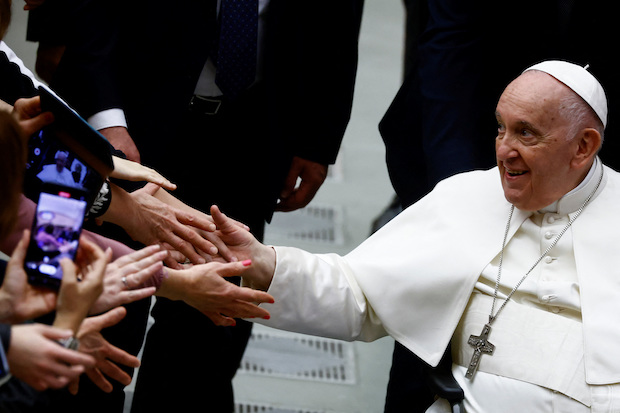Pope extends sexual abuse law to include lay leaders

People reach out to touch Pope Francis’ hand during his meeting with the faithful of parishes from Rho at the Vatican, March 25, 2023. (YARA NARDI / Reuters)
VATICAN CITY — Pope Francis on Saturday updated rules on dealing with sexual abuse in the Roman Catholic Church, expanding their scope to include lay Catholic leaders and spelling out that both minors and adults can be victims.
The pope issued a landmark decree in 2019 making it obligatory for all priests and members of religious orders to report any suspicions of abuse, and holding bishops directly accountable for any abuse they commit themselves or cover up.
The provisions were initially introduced on a temporary basis, but on Saturday the Vatican said they would become definitive from April 30 and include additional elements aimed at strengthening the fight against abuse within the Church.
Abuse scandals have shredded the Vatican’s reputation in many countries and have been a major challenge for Pope Francis, who has passed a series of measures over the past 10 years aimed at holding the Church hierarchy accountable.
Critics say the results have been mixed and have accused Francis of being reluctant to defrock abusive prelates.
Article continues after this advertisementThe new norms now encompass leaders of Vatican-sanctioned organizations run by lay people, not just priests, following numerous allegations in recent years against lay leaders, who have been accused of abusing their positions to sexually exploit those in their charge.
Article continues after this advertisementWhereas the original rules covered sexual acts targeting “minors and vulnerable persons,” the new version provides a wider definition of victims, referring to crimes committed “with a minor or with a person who habitually has an imperfect use of reason or with a vulnerable adult.”
The Vatican said Church members had an obligation to report cases of violence against religious women by clerics, as well as cases of harassment of adult seminarians or novices.
BishopAccountability.org, a not-for-profit organization looking to document the abuses within the Roman Catholic Church, said the revision was “a big disappointment” and fell short of the “extensive revamping” the policy against the abuses would have required.
The policy “remains self-policing packaged as accountability”, said Anne Barrett Doyle, co-director of BishopAccountability.org, adding bishops remained in charge of investigating allegations against fellow bishops.
The updated provisions have been unveiled a month after the Roman Catholic religious order of Jesuits said that accusations of sexual, psychological, and spiritual abuse against one of its most prominent members were highly credible.
About 25 people, mostly former nuns, have accused Father Marko Ivan Rupnik, 69, a well-known religious artist of various forms of abuse, either when he was a spiritual director of a community of nuns in his native Slovenia about 30 years ago, or after he moved to Rome to pursue his career as an artist.
Rupnik has not spoken publicly of the accusations, which have rattled the worldwide order, of which the pope is a member.